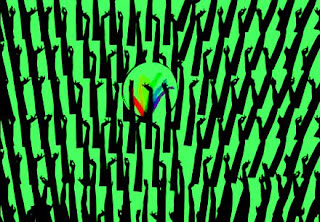The proliferation of online communities, within the Social Movement; has so far been a process fraught with confrontation, but propelled by enthusiasm. The essential problem that's been identified was that Internet users lacked a secure, centralized place to hold their identity. The way the Net is now organized, we carom between different "walled silos" that take our data and make use of it or sell it, without our knowledge. Recent opinion proposes the need for a new layer of the Internet, where personal identity information and transactions would be stored in one place, for the user's benefit. The user would then choose what parts of their profile to reveal to any group or organization they visited.
This would also allow for different organizations or companies to collaborate effectively, as their users could let them know how they were connected with other groups. Today, different NGOs reduplicate effort and even compete against each other for the same members and sponsors, with little coordination, fighting for scarce resources. It sounds quite dry at first, but if we spend time studying the issue, we will find that the lack of a way for people to maintain their own identity and control their own data is a massive problem, one that thwarts the healthy development of civil society.
The opportunity exists to implement a new vision, through a model of building a membership card program for the 'cultural creatives', the most progressive and ecologically aware subset of consumers. Most community incubators intend to build user-centered profile systems that integrate the latest aspects of this development protocol. Judging by the impassioned personal and philosophical exchanges on these forums; there is a vast amount of extraordinary material, important ideas and visionary testimonies, that need a professional media presence to reach beyond a small group and influence the broader cultural debate.
Recognizing demand, early adopters actively build social networks to bring together growing communities. This is mostly done on modest investments, often using Drupal, an open-source publishing platform. The shift from simply running another social network in virtual space to using face-to-face meetups, as a hub for organizing off-line real-world communities, also happens organically; driven by members with strong backgrounds in community organizing. They guide groups coming together in cities all over the world; realizing that, developing these nascent connections into vibrant communities, is the central mission of the project.
Even in this early and challenging stage communities have learned that, the merging of professional on-line media with a social network, which supports the growth of off-line communities - moving from virtual to visceral - is an extremely powerful innovation. As a new form of 'interdependent media', they can continually offer new tools and ideas for any growing community to explore, then report on their discoveries through articles and videos. All of this is happening at a time when the financial system and other forms of social infrastructure are breaking down and the future looks increasingly uncertain for many.
As a recent issue of Time magazine predicts, the new ten-year trend is "The Dropout Economy", where young people are forced to explore radical alternatives as work disappears and the financial burden becomes intolerable: "As conventional high schools and colleges prepare the next generation for jobs that won't exist, we're on the cusp of a dropout revolution, one that will spark an era of experimentation in new ways to learn and new ways to live."
Time's forecast could be read as a desperate plea that young people, instead of rising up in fury against the older generation that depleted the planet’s resources at their expense, will make virtue out of necessity: "Faced with the burden of financing the decades-long retirement of aging boomers, many of the young embrace a new underground economy, a largely untaxed archipelago of communes, co-ops, and kibbutzim that passively resist the power of the granny state while building their own little utopias." Ahead of the curve, activists are developing communities to serve and support these emergent, now inevitable, circumstances.

2 comments:
Post a Comment